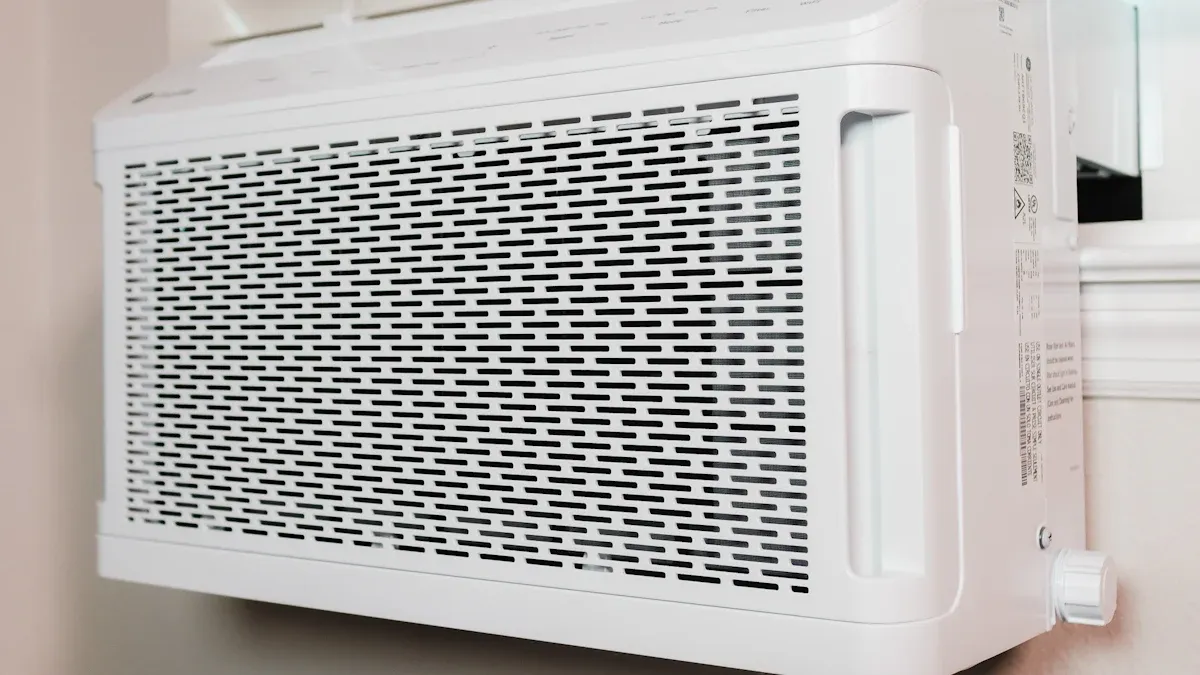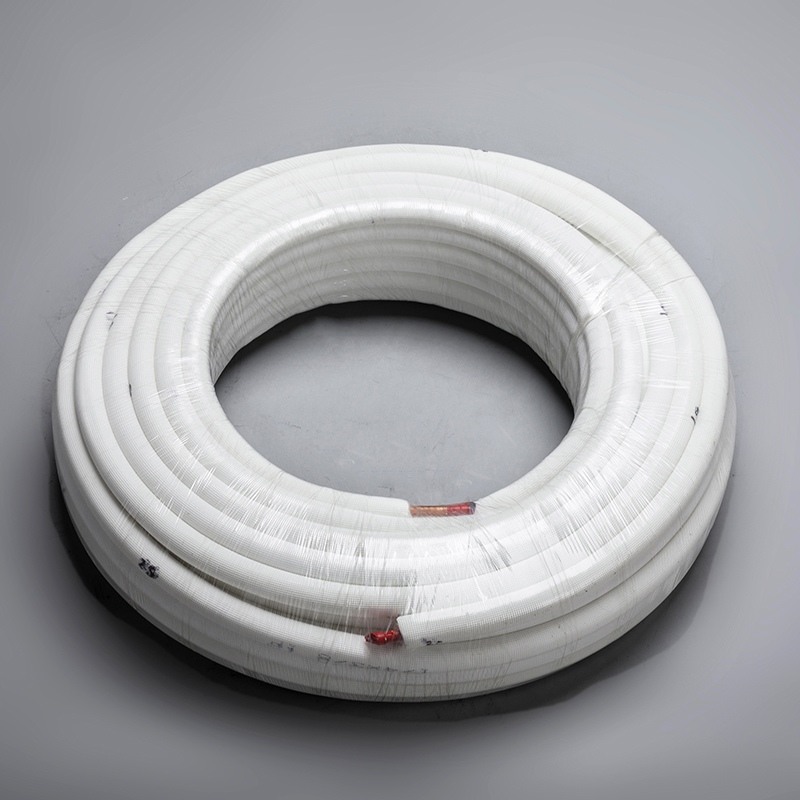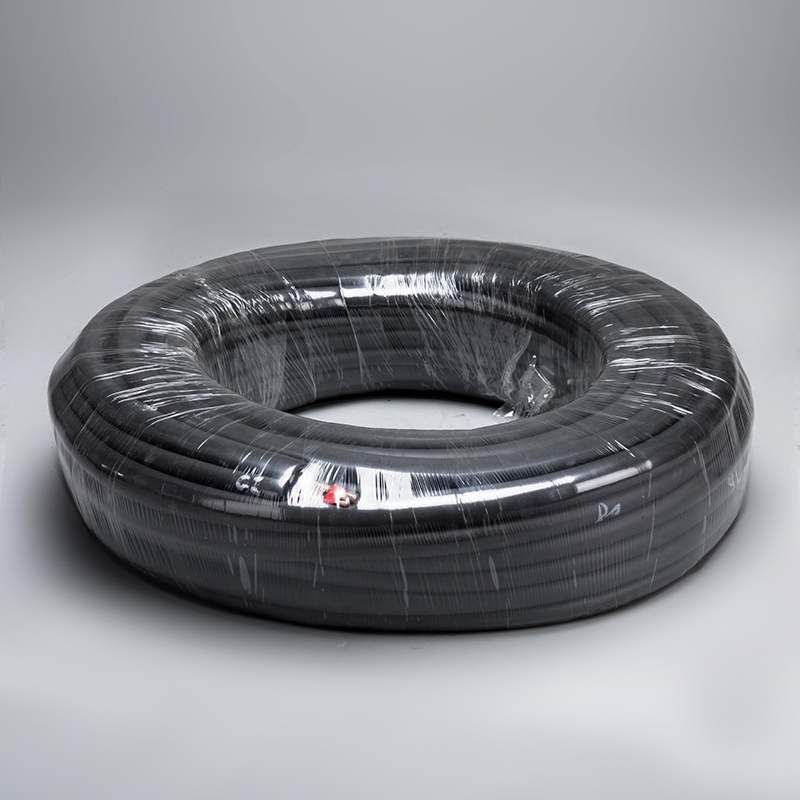What Is a Copper Pipe in Air Conditioning Systems and Why Is It Important

Copper pipe for air conditioner systems plays a crucial role in their functionality. These pipes transport refrigerant and facilitate efficient heat transfer, making them essential components. Copper's unique properties, such as excellent heat conductivity and rust resistance, make it an ideal choice for air conditioners. For instance, copper pipe for air conditioner units releases heat effectively, enhancing overall system performance. Recent studies emphasize the energy-saving benefits of copper in HVAC systems, and its application is growing in eco-friendly building projects. Incorporating copper pipe for air conditioner designs results in smaller, more energy-efficient systems, leading to improved and compact solutions.
Key Takeaways
Copper pipes are very important for air conditioners. They move refrigerant and help with heat transfer for better cooling.
Picking the right copper pipe type can boost performance. Types K, L, and M work for different pressures and costs.
Copper pipes don’t rust or leak, helping air conditioners last longer. This also saves money on repairs and keeps them working well.
Copper moves heat well, allowing smaller and energy-saving systems. This lowers electricity bills and helps the environment.
Copper pipes are flexible and easy to install. This makes them a smart choice for many HVAC designs.
Copper Pipes and Tubes in Air Conditioning Systems

Definition and Function
Copper pipes and tubes are key parts of air conditioners. They carry refrigerant, helping move heat between inside and outside units. Copper’s ability to conduct heat ensures better cooling. These pipes also stop leaks and resist rust, keeping systems working well. Their strength and dependability make them vital for HVAC systems.
Types of Copper Pipes for Air Conditioner Systems
There are different copper pipes made for specific air conditioning needs. They differ in thickness, price, and how they perform.
Type | Wall Thickness | Advantages | Disadvantages | Best For |
|---|---|---|---|---|
Type K | Thick | - Very strong | - Costs more | Underground and high-pressure uses |
Type L | Moderate | - Works for many uses | - Less durable than Type K | Most home and business AC systems |
Type M | Thin | - Cheapest option | - Not very strong | Low-pressure systems on a budget |
Copper pipes are also grouped by what they’re made of and how they work. For example:
Type | Composition | Performance Characteristics |
|---|---|---|
TP2 | 0.015-0.04% phosphorus | Great for welding and bending; used in HVAC systems |
TU1 | ≥ 99.97% copper | Very pure, conducts heat and electricity well, resists rust |
T2 | 99.90% copper | Best for high heat transfer; highest purity type |
Knowing these types helps you pick the best copper pipes. This ensures your air conditioner works well and saves money.
Integration into HVAC System Design
Copper pipes fit easily into HVAC system designs. They bend well, making them simple to install in tricky spaces. Copper can handle high pressure and temperature changes, making it perfect for refrigerant flow. Engineers often choose copper for homes, businesses, and factories.
Copper pipes also help make smaller systems. Their great heat transfer allows for smaller coils and parts. This reduces the air conditioner’s size, saving space and energy. Copper pipes are a key part of modern HVAC systems.
The Role of Copper Pipes in Air Conditioning Systems
Moving Refrigerant Smoothly
Copper pipes are important for moving refrigerant in air conditioners. They help refrigerant travel between the compressor, condenser, and evaporator. This movement is key to keeping your space cool. Copper is strong and steady, so it keeps refrigerant flowing well, even under pressure.
Copper’s special traits, like resisting rust and being flexible, make it great for this job. For example, copper pipes work well in condensers and evaporators. They handle heat transfer and last a long time. The table below shows how copper pipes improve refrigerant flow and system dependability:
Application | Evidence |
|---|---|
Refrigerant Transmission | Copper pipes keep refrigerant flow steady and durable, boosting cooling efficiency. |
Condenser and Evaporator | Copper pipes resist rust and transfer heat well, aiding heat exchange. |
Throttle | Copper’s flexibility and weldability make it great for throttle parts, ensuring smooth refrigerant flow. |
Pipe Connectors | Copper resists rust, making connections strong and leak-proof for safe operation. |
Using copper pipes helps your air conditioner work better and last longer.
Helping Heat Move Quickly
Copper pipes are great at moving heat, which is vital for air conditioners. When refrigerant flows through them, copper’s heat-conducting ability moves heat fast. This helps your air conditioner cool your space effectively.
Copper’s heat transfer ability also allows smaller parts to work well. For example, small copper coils can cool as well as bigger coils made of other materials. This saves space and energy. By moving heat quickly, copper pipes keep your air conditioner running efficiently and using less energy.
Stopping Leaks and Keeping the System Sealed
A sealed air conditioner stops leaks and works efficiently. Copper pipes are strong and resist rust, keeping connections tight over time. This lowers the chance of leaks, which can hurt cooling and raise energy bills.
Copper is also flexible, making it easy to create tight seals. Whether in connectors or other parts, copper keeps refrigerant inside the system. This protects the environment and makes your air conditioner last longer. Choosing copper pipes gives you a reliable and efficient cooling system.
Why Copper Pipes Are the Best Choice for Air Conditioners
Great at Moving Heat
Copper pipes are great for air conditioners because they move heat well. This helps keep your home cool and comfortable. When refrigerant flows through copper pipes, heat moves faster. This makes your air conditioner work better.
Copper is better at moving heat than other materials. Studies show copper pipes improve cooling and save energy. For example, they lower the compressor's workload, using less power. This makes copper a smart choice for eco-friendly and money-saving HVAC systems.
Benefit | Explanation |
|---|---|
Rust Resistance | Copper pipes resist rust, lasting longer in air conditioners. |
Heat Transfer | Copper moves heat quickly, making air conditioners work better. |
Germ Resistance | Copper naturally fights germs, good for clean environments. |
Choosing copper pipes helps your air conditioner cool well, save energy, and cut costs.
Strong and Rust-Resistant
Copper pipes are strong and don’t rust, making them reliable. Air conditioners face moisture, heat, and weather changes. Copper’s natural strength stops rust and damage, helping your system last longer.
Tests prove copper works well in tough conditions. For example:
Test Type | What It Does |
|---|---|
Water Testing | Checks rust resistance by soaking copper in water and studying changes. |
Weight Testing | Measures weight loss from rust by weighing copper before and after exposure. |
Real-Life Testing | Mimics real conditions like weather changes and moisture to test copper’s durability. |
These tests show copper pipes stay strong in harsh conditions. This means fewer repairs and replacements, saving you money over time.
Easy to Bend and Install
Copper pipes are easy to bend, making installation simple. You can shape them without breaking, which saves time and effort. Fewer fittings are needed, lowering costs and reducing leaks.
Here’s why copper’s flexibility is helpful:
Copper bends easily, making it simple to install.
Fewer fittings mean fewer leaks and lower costs.
Rolled copper pipes have fewer joints, making systems more secure.
Using copper pipes makes setting up air conditioners easier and faster. Their flexibility also works well in tight spaces or tricky designs. This is why copper is a top choice for homes and businesses.
Long-Term Cost Efficiency
When buying an air conditioner, you want it to last. Copper pipes help save money over time, making them a smart pick. They are strong, resist rust, and keep systems working well for years.
Copper’s strength makes air conditioners reliable for a long time. Unlike other materials, copper doesn’t rust or break easily. This means fewer repairs and replacements, saving you money. For example, copper pipes can last up to 50 years. This long life means fewer problems and lower maintenance costs.
Copper also saves energy, cutting your bills. Its ability to move heat quickly helps cool your space better. This lowers the compressor’s workload, using less electricity. Over time, this adds up to big savings. Choosing copper is good for your wallet and the environment.
The table below shows why copper piping is a cost-effective choice:
Advantage | Copper Piping |
|---|---|
Corrosion Resistance | Strong against rust |
Heat Tolerance | Handles high temperatures well |
Bacteria Resistance | Stops bacteria from growing |
Longevity | Lasts up to 50 years |
Copper also fights bacteria, keeping air clean and healthy. This is great for homes and businesses, avoiding health-related costs. It makes copper an even smarter choice.
Copper pipes are easy to install, saving time and money. They bend easily, needing fewer joints, which lowers leak risks. With fewer problems, your air conditioner works well for years, giving you peace of mind.
Comparing Copper Pipes to Other Materials

Copper vs. Aluminum Pipes
Copper and aluminum pipes work differently in HVAC systems. Copper pipes move heat better, helping cool spaces faster. Aluminum pipes don’t transfer heat as well, which lowers efficiency. Copper is also stronger and resists rust, lasting longer than aluminum.
Aluminum pipes are lighter and cost less than copper. This makes aluminum a cheaper option for some uses. But copper’s better performance often makes it worth the higher price. The table below shows their differences:
Property | Copper | Aluminum |
|---|---|---|
Heat Transfer | Moves heat very well | Moves heat less effectively |
Durability | Strong and rust-resistant | Weaker and rust-prone |
Weight | Heavier | Lighter |
Cost | Costs more | Costs less |
Copper pipes help HVAC systems work better and last longer. They are a smart investment.
Copper vs. Plastic Pipes
Plastic pipes are sometimes used in HVAC systems but have limits. Copper pipes move heat better, which is key for cooling. They also handle extreme temperatures, from -40°F to 400°F, and high pressure over 400 psi. Plastic pipes can’t match these abilities, making them less dependable.
Copper pipes are also tougher and last longer. They resist damage and wear, ensuring good performance for years. Plus, copper is recyclable, making it eco-friendly. The table below compares them:
Performance Metric | Copper Pipes | Plastic Pipes (not specified) |
|---|---|---|
Thermal Conductivity | Excellent at moving heat | Not available |
Temperature Range | Works from -40°F to 400°F | Not available |
Pressure Tolerance | Handles over 400 psi | Not available |
Durability | Very strong and long-lasting | Not available |
Recyclability | Can be recycled | Not available |
For dependable HVAC systems, copper is the better choice.
Why Copper Pipes Remain the Industry Standard
Copper pipes are the top choice for HVAC systems. They move heat well and resist rust, making them great for refrigerants. Copper is strong and handles high pressure, working reliably for a long time.
Experts agree that copper is the best material. It lasts a long time and keeps systems running efficiently. Copper also meets safety rules, making it trusted for homes and businesses.
Copper’s great features, like heat transfer and recyclability, make it essential for HVAC systems. Choosing copper means better performance, energy savings, and long-lasting reliability.
How Copper Pipes Improve System Efficiency and Performance
Helping Air Conditioners Cool Better
Copper pipes make air conditioners cool spaces faster. They move heat quickly, helping refrigerant absorb and release heat. This makes cooling more effective and quicker. Smaller copper parts work as well as bigger ones made of other materials.
Tests show thinner copper tubes save refrigerant and lower costs. Grooved tubes improve heat transfer and make systems smaller and lighter. The table below explains these findings:
Evidence Description | Effect on Cooling Efficiency |
|---|---|
Using Φ4mm copper tubes saves refrigerant and lowers costs. | Improves system performance and efficiency. |
Smaller tubes with grooves transfer heat better. | Creates lighter coils with equal or better cooling. |
Tests with Φ5mm grooved copper tubes cut copper use by 43% and costs by 40%. | Boosts cooling power and energy efficiency. |
These improvements show why copper pipes are key for better cooling systems.
Saving Energy
Copper pipes help air conditioners use less energy. They move heat easily, so the system needs less power to cool. This lowers electricity bills and helps the environment.
Benefits of copper pipes include:
Better heat transfer than plastic or PVC.
Lower energy costs due to efficient cooling.
Keeps temperatures steady, improving HVAC system performance.
Choosing copper pipes makes air conditioners work well while saving energy and money.
Making Systems Last Longer
Copper pipes help air conditioners last longer. They are strong and resist rust, even in tough conditions. This means fewer repairs and replacements, saving time and money.
Copper’s flexibility also helps prevent leaks. It creates tight connections, keeping refrigerant inside the system. With copper pipes, your air conditioner stays reliable for years, giving you peace of mind.
Copper pipes are very important in air conditioning systems. They help refrigerant move smoothly and transfer heat quickly. This keeps the system working well for a long time. Copper is great for HVAC systems because it conducts heat, resists rust, and bends easily.
Using copper pipes gives you a strong and energy-saving cooling system.
When you choose copper, your air conditioner works better and saves money. Over time, this makes copper pipes a smart and necessary choice for modern air conditioners.
FAQ
1. Why are copper pipes better than aluminum pipes for air conditioners?
Copper pipes move heat faster than aluminum pipes. They don’t rust and last longer, even in tough weather. Aluminum costs less, but copper’s strength and performance make it a smarter choice for long-lasting cooling.
2. Can copper pipes stop refrigerant leaks?
Yes, copper pipes are strong and bend easily to make tight seals. This lowers the chance of leaks. They also resist rust, keeping refrigerant safely inside the system for a long time.
3. How do copper pipes save energy?
Copper pipes move heat quickly, helping air conditioners cool faster. This makes the compressor work less, using less energy. Over time, this saves money on electricity bills.
4. Are copper pipes good for the environment?
Yes, copper pipes can be recycled. They last a long time, which means less waste. Their energy-saving features also help lower pollution. Choosing copper is better for the planet.
5. Do copper pipes need special care?
Copper pipes are easy to take care of. They don’t rust and are very strong, so they need fewer repairs. Checking the system regularly helps, but copper pipes usually work well without much upkeep.
See Also
The Benefits of Using Copper Pipes in AC Systems
Pure Copper Pipes: Essential for Optimal Air Conditioning
How Copper Pipes Transform the Efficiency of Air Conditioning


